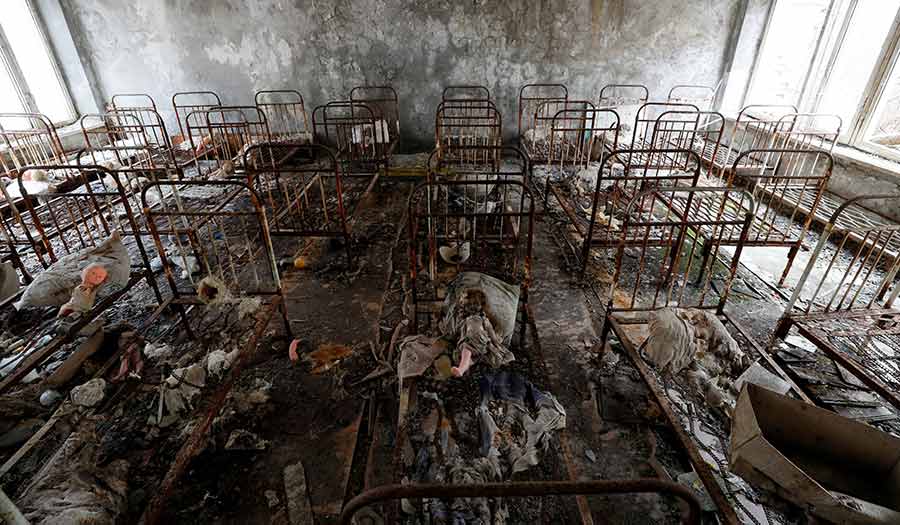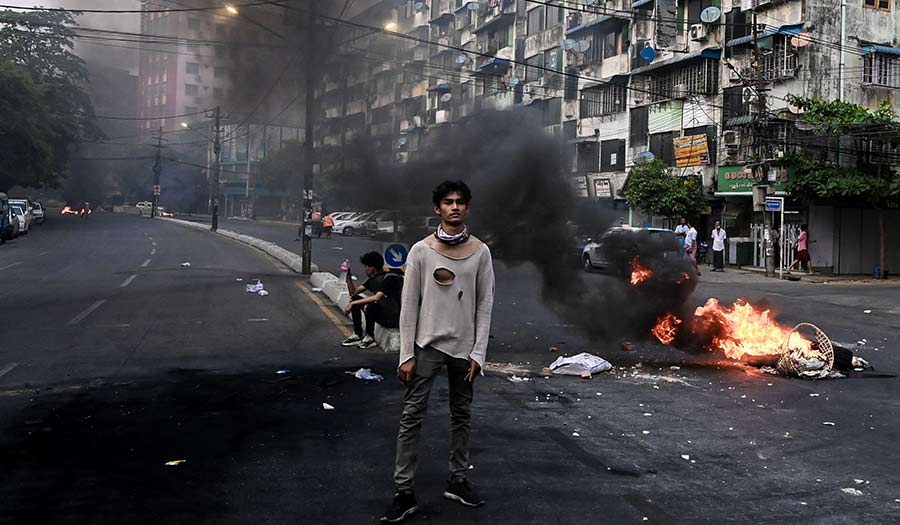 Reuters/Gleb Garanich
Reuters/Gleb Garanich
Article
Over three decades later, the world’s worst nuclear disaster continues to have lessons for mankind today.
Learn the why behind the headlines.
Subscribe to the Real Truth for FREE news and analysis.
Subscribe NowThe vast and empty Chernobyl Exclusion Zone around the site of the world’s worst nuclear accident is a menacing monument to human mistakes. Reactor No. 4 at the power plant 65 miles north of the capital Kyiv exploded and caught fire deep in the night on April 26, 1986, shattering the building and spewing radioactive material high into the sky.
Soviet authorities added fuel to the fire by failing to tell the public what had happened—although the nearby plant workers’ town of Pripyat was evacuated the next day, the 2 million residents of Kyiv were not informed despite the fallout danger. The world learned of the disaster only after heightened radiation was detected in Sweden.
Eventually, more than 100,000 people were evacuated from the vicinity and a 1,000-square-mile exclusion zone was established where the only activity was workers disposing of waste and tending to a hastily built sarcophagus covering the reactor.
Chernobyl reveals the multi-faceted characteristics defining mankind: the incredible ingenuity of drawing electricity from nuclear materials, tragic mistakes made worse by mismanagement and hubris—and dogged optimism, despite Chernobyl still being abandoned today.
The nuclear disaster is also a testament to the long legs of human tragedies. The Chernobyl plant is out of service, but there is still much work to be done at the decommissioned plant. All four of its reactors are to be dismantled only by 2064—79 years after that ill-fated night.
Radiation continued to leak from the reactor building until 2019, when the entire building was covered by an enormous arch-shaped shelter. When robots inside the shelter began dismantling the reactor, officials felt new optimism about the zone.
“This is a place of tragedy and memory, but it is also a place where you can see how a person can overcome the consequences of a global catastrophe,” said Bohdan Borukhovskyi, Ukraine’s deputy environment minister.
“We want a new narrative to appear—it was not a zone of exclusion, but a zone of development and revival,” he said.
For him, that narrative includes encouraging tourism.
“Our tourism is unique, it is not a classic concept of tourism,” he said. “This is an area of meditation and reflection, an area where you can see the impact of human error, but you can also see the human heroism that corrects it.”
The Chernobyl zone saw its tourism increase twofold after the lauded television miniseries of 2019 and officials hope that level of interest will continue, or grow, once the global pandemic has receded.
One of the prime draws for tourists is to see the ruins of Pripyat, the once-modern town of 50,000 now being taken over by decay and vegetation. Work is underway to build paths to make it easier for visitors to navigate the ruins.
Ukraine also has decided to use the deserted zone as the site for its centralized storage facility for the spent fuel from the country’s four remaining nuclear power plants, and that is to open this year. Until recently, the fuel was disposed of in Russia.
Storing the spent fuel at home will save the country an estimated $200 million a year.
“We are doing everything possible so that this territory, where it is now impossible for people to live, is used with benefit and gives the country a profit,” said Serhiy Kostyuk, head of the agency that manages the exclusion zone.
Long-term effects on human health remain the subject of intense scientific debate. Immediately after the accident, 30 plant workers and firefighters died from acute radiation sickness. Later, thousands of people died from radiation-related illnesses such as cancer.
The Chernobyl disaster points out one more characteristic of mankind: how easily we forget.
To combat this, enthusiasts have created the Chornobyl App, which includes declassified documents about the disaster and allows users to explore augmented-reality view of the zone and structures.
“Sixty percent of Ukrainians do not know the date of the accident and we decided that there should be a resource where a lot of verified information is collected,” said Valeriy Korshunov, one of the free app’s developers.
Every manmade disaster is unique—dictated by the people involved, the place it happened and the time period it occurred. Yet every manmade disaster is also the same—offering mankind an opportunity to reflect on the human condition.
After the September 11 terror attacks, columnist Peggy Noonan summarized in The Wall Street Journal the complex, jumbled track record of humanity. Her words help outline the paradox of mankind—incredible advancement coupled with terrible ills.
“In the long ribbon of history, life has been one long stained and tangled mess, full of famine, horror, war and disease. We must have thought we had it better because man had improved. But man doesn’t really ‘improve,’ does he? Man is man. Human nature is human nature; the impulse to destroy coexists with the desire to build and create and make better.”
But why is this the case? Why is human nature seemingly hardwired into mankind? These are the sorts of questions asked in the aftermath of disasters. They demand answers.
Real Truth Editor-in-Chief David C. Pack delves into this topic in his article What Is Human Nature? Why humanity is the way it is does have an answer! This knowledge will help you make sense of terrible tragedies, such as Chernobyl, as well as allow you to understand how human nature works inside of you.
- Real Truth Magazine Articles
- GEOPOLITICS
 Myanmar on the Edge – Should We Intervene?
Myanmar on the Edge – Should We Intervene?


